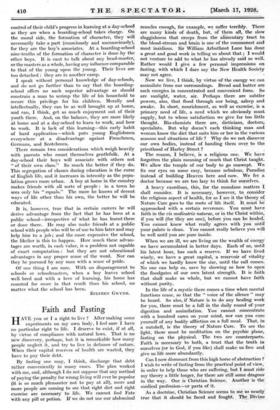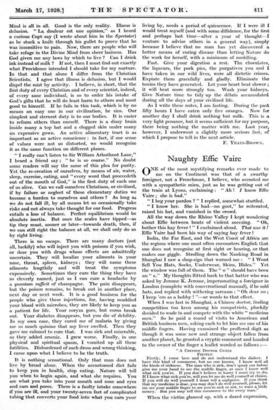Faith and Fasting
Tir AVE you or I a right to live ? After making some -IX experiments on my own body, I feel sure I have no particular right to life. I deserve to exist, if at all, by virtue of compliance with natural laws. That is no new discovery, perhaps; but it is remarkable how many people neglect it, and try to live in defiance of nature. When their capital reserves of health are wasted, they have to pay their debt.
By fasting one may, I think, discharge that debt rather conveniently in many cases. The plan worked with me, and, although I do not suppose that any method of paying the penalty for wrong living will ever be popular (it is so much pleasanter not to pay at all), more and more people are coming to see that right diet and right exercise are necessary to life. We cannot fool Fate with any pill or potion. If we do not use our abdominal , . .
A heavy exordium, this, for the mundane matters I shall consider. It is necessary, however, to consider the religious aspect of health, for as I see it the theory of Nature Cure goes to the roots of life itself. It must be approached with a certain reverence. You must have faith in the vis medicatrix naturae, or in the 'Christ within; if you Will (for they are one); before You can be healed. You cannot know what really agrees with you uiitii your palate is clean. You cannot really believe you will be well until you are pure inside.
When we are ill, we are living on the wealth of energy we have accumulated in better days. Each of us, until his latest hour, has such a reserve. If we have lived wisely, we have a great capital, a reservoir of vitality of which we hardly know the size, until the call comes. No one can help us, save by showing us how to open the floodgates of our own latent -strength. It is faith that shall make us whole, but we cannot have faith without purity.
In the life of a mystic there comes a time when mental functions cease, so that the "voice of the silence" may be heard. So also, if Nature is to do any healing work for you,, there must be a lull, in the daily round of your digestion and assimilation. You cannot concentrate with a hundred cares on your mind, nor can you cure yourself of any bodily affliction on a full meal. That, in a nutshell, is the theory of Nature Cure. To see the light, there must be meditation on the psychic plane, fasting on the physical. The two are counterparts. Faith is necessary to both, a trust that the truth in ourselves (or in God, if you like) shall make us free and give us life more abundantly.
Can I now dismount from this high horse of abstraction ? I wish to write of fasting from the practical point of view, in order to help those who are suffering, but I must ride my theory a little longer, for there are still some dragons in the way. One is Christian Science. Another is the medical profession—or parts of it.
As a doctrine, Christian Science seems to me so nearly true that it should be faced and fought. The Divine muscles enough, for example, we suffer terribly. There are many kinds of death, but, of them all, the slow sluggishness that creeps from the alimentary tract to the blood-stream and brain is one of the commonest and most insidious. Sir William Arbuthnot Lane has done a great and good work in telling us about that ; I would not venture to add to what he has already said so well. Rather would I give a few personal impressions on fasting, with which I dare say the New Health Society may not agree.
Now we live, I think, by virtue of the energy we can assimilate from our surroundings. Bread and butter are such energies in concentrated and convenient form. So are sunlight, water, air. Perhaps there are subtler powers, also, that flood through our being, asleep and awake. In short, nourishment, as well as exercise, is a primary need of life, a need which we obviously must supply, but to whose satisfaction we give far too little thought. Bio-chemists there are, dieticians, doctors; specialists. But why doesn't each thinking man and woman know the diet that suits him or her in the various seasons and situations of life ? Why do we not discover our own bodies, instead of handing them over to the priesthood of Harley Street ?
The reason, I _believe, is a religious one. We have forgotten the plain meaning of much that Christ taught. We allow the temple of our body to go uns-wept. We fix our eyes on some 'easy, because nebulous, Paradise instead of building Heaven here and now. We fee a doctor because we are too lazy to think for ourselves. „ _ Mind is all in all. Good is the only reality. Illness is delusion. "La., douleur est une opinion," as I heard a curious Copt-say (I wrote about him in the Spectator) as he stuck a knife through his gullet to prove that he was insensitive to pain. Now, there are people who will take refuge in the Divine Mind from sheer laziness. Has God given me any laws by which to live? Can I drink ink instead of milk? If not, then I must find out exactly what Providence intended I should take for my nurture: In that and that alone I differ from the Christian Scientists. I agree that illness is delusion, but I would dispel the mist by activity. - I believe, in short, that the liist duty of every Christian and of every scientist, indeed, of every sane individual, is so to order his. intake of God's gifts that he will do least harm to others and most good to himself. If he fails in this task, which is by no means an easy one in our civilization, he sins. Our simplest and sternest duty is to our bodies. It is easier to reform others than oneself. There is a dizzy brain inside many a top hat and a clogged skin under many an expensive gOwn. An active alimentary tract is as important as an active conscience: in fact, if our sense of values were not so distorted, we would recognize it as the same function on different planes. ' " I really can't listen to Sir William Arbuthnot Lane," I heard a friend say; "he is so coarse." No doubt some readers will say the same of this plea for purity. Yet the re-creation of ourselves, by means of air, water, sleep, exercise, eating, and "every word that proceedeth out of the mouth of God," is the first duty of each one of us alive. Can we call ourselves Christians, or civilized, if by failure or neglect of these elementary duties we become a burden to ourselves and others? As long as we do not fall ill, by all means let us occasionally take risks and not always take thought for our food. Progress entails a loss of balance. Perfect equilibrium would be absolute inertia. But once the scales have tipped—as tip they must, sooner or later—towards death, then, if we can still right the balance at all, we shall only do so by right living There is no escape. There are many doctors (not all, luckily) who will inject you with poisons if you wish, or dose you with drugs whose effects are admittedly uncertain. They will localize your ailments in your nose, throat, spleen, kidneys; they will name these ailments -lengthily and will treat the symptoms expensively. Sometimes they cure the thing they have So cleverly named, just as I can cure a headache by a quantum sufficit of champagne. The pain disappears, but the poison remains, to break out in another place, next day or next week. It is a good business for the people who give these injections, for, having muddied your blood with microbes, they are likely to keep you as a patient for life. Your coryza goes, but corns break out. Your diabetes disappears, but you die of debility. In my own case, they cured me of malaria by giving me so much quinine that my liver swelled. Then they gave me calomel to cure that. I was sick and miserable, so they added arsenic. I grew worse. Finally, in one physical and spiritual spasm, I vomited up all these futilities. Disburdened of such dross and wrong thinking, I came upon what I believe to he the truth.
It is nothing sensational. Only that man does not live by bread alone. When the accustomed diet fails to keep you in health, stop eating. Nature will tell you when to begin again, and what she requires. You are what you take into your mouth and nose and eyes and ears and pores. There is a faulty intake somewhere if you are ill, and your twenty-seven feet of complicated tubing that converts your food into what you earn youi living by, needs a period of quiescence. If I were ill I would treat myself (and with some diffidence, for the first and perhaps last time—after a year of thought—t venture to advise others in a general way), simply because I believe that no man has yet discovered a better means of curing disease than letting Nature do the work for herself, with a minimum of meddling. Fast. Give your digestion a rest. The chocolates, the liqueurs, the pork pies, the purgatives you and I have taken in our wild lives, were all dietetic crimes. Expiate them gracefully and gladly. Eliminate the toxins they have generated. Let your heart beat slower; it will beat more strongly too. Wash your kidneys, Give Nature time to tidy up the debris accumulated during all the days of your civilized life. As I write these notes, I am fasting. During the past fifty hours I have eaten only five oranges. Now for another day I shall drink nothing but milk. This is a very light penance, but it seems sufficient for my purpose, there being nothing the matter with me. Last year, however, I underwent a slightly more serious fast, of which I propose to tell in the next article.
F. YEATS-BROWN.











































 Previous page
Previous page